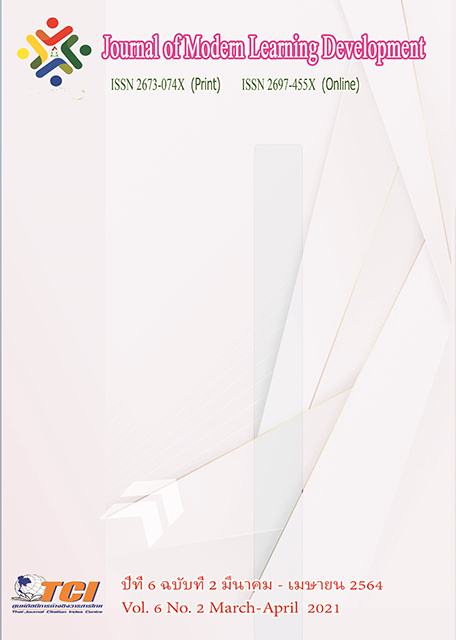An Application of the Belief in the Spiritual Possession of the Community in the Area of Municipality of Nongbua Sub-District, Muang District, Udon Thani Province
Main Article Content
Abstract
The three purposes of this research were; 1) to study the three types of deities in Theravada Buddhism 2) to study the situation of belief in the spiritual possession of the community in the area of Municipality and 3) to analyze the belief in the spiritual possession of the community. This research was a qualitative research by studying the data from the documents and interviewing the Key informants consisting of 25 subjects and reporting the results of this research by using the descriptive analysis.
The results of the research were found that the deities in Buddhism are , that is, 1) the creatures having the spontaneous births with the power of good kamma that was done in the previous life consisting of three types, namely, 1) Gods by convention (Sammati- deva) 2) Gods by rebirth (Upapati-deva) and 3) Gods by purification (Visuddhi-deva). The analysis of the deities appears in the scriptures in Buddhism and various Suta. In addition to this, the deities still appear in some discourses that the five groups of deities recite the word “Namo” (salutation) for 5 chapters and request the Buddha for his sermon as said it shows that the deities really exist. 2) The beliefs in the spiritual possession of the community in the Municipality of Nongbua Sub-district, were found that the belief in the deities and ghosts has existed in the community for a long time because they believe that the ghosts are their ancestors who passed away or simply saying to understand that they are the ancestors’ souls. The beliefs in the spiritual possession towards the society can be classified into two aspects, that is, 1) in the aspect of consultation such as people’s diseases and pains, to give information related to foretell the horoscope , to avert the effect of misfortune and to set up the name and to find out an auspicious occasion and the blessings 2) to believe that the body of the spiritual possession is the representative of the deities who are the power and to believe that the spiritual possessor can raise the social and economical status and to believe that the spiritual possessor can cure various diseases. and 3) the results of analyzing the beliefs in the spiritual possession in Buddhism in the area of Municipality of Nongbua sub-district were found that the Buddhists in the area of Municipality of Nongbua Sub-district believe that the word “possessor “means the representative who has an authority and can produce various things as they require or the benefits and they still believe that the representative can cure various diseases . The virtues of the spiritual possession compose of four virtues, that is, the aspect of tradition and culture, society, economy, and politics.
Article Details
References
ทิพย์สุดา พรรณสหพาณิชย์. (2545). บทบาทสตรีชาวผู้ไทยในพิธีกรรมเหยาตำบลป่าไร่อำเภอดอนตาล จังหวัดมุกดาหาร”. รายงานการศึกษาค้นคว้าอิสระ. บัณฑิตวิทยาลัย: มหาวิทยาลัยมหาสารคา
พระพรหมคุณาภรณ์(ป.อ.ปยุตฺโต). (2556). พุทธธรรม. (พิมพ์ครั้งที่ 5). กรุงเทพมหานคร: โรงพิมพ์มหาจุฬาลงกรณราชวิทยาลัย
พระเทพมุนี (วิลาศญาณวโร). (2527). ภูมิวิลาสินี. กรุงเทพมหานคร: รุ่งเรืองธรรม.
พระมหาสมจินต์ สมฺมาปญฺโญ (วันจันทร์). (2534). นรกและสวรรค์ในพุทธปรัชญาเถรวาท. วิทยานิพนธ์
พุทธศาสตรมหาบัณฑิต สาขาวิชาพระพุทธศาสนา. บัณฑิตวิทยาลัย: มหาจุฬาลงกรณราชวิทยาลัย
พระมหาสุพรรณ เผือกพันธ์. (2543). การศึกษาความเชื่อผีปอบในบริบทสังคมไทยพุทธศึกษาเฉพาะกรณี
หมู่บ้านหนองทามน้อยจังหวัดศรีสะเกษ. วิทยานิพนธ์ศาสนาเปรียบเทียบมหาบัณฑิต. บัณฑิต
วิทยาลัย: มหาวิทยาลัยมหิดล
มัลลิกา จันทรา, (2549). ความเชื่อและพิธีกรรมผีฟ้าของบ้านสว่างดอนดู่ตำบลบ้านเม็งอำเภอหนองเรือ จังหวัดขอนแก่น. วิทยานิพนธ์ปริญญาศิลปศาสตรมหาบัณฑิตสาขาไทยศึกษาเพื่อการพัฒนา. บัณฑิตวิทยาลัย: มหาวิทยาลัยราชภัฏเลย,
มหาจุฬาลงกรณราชวิทยาลัย. (2539).พระไตรปิฎกภาษาไทยฉบับมหาจุฬาลงกรณราชวิทยาลัย. กรุงเทพมหานคร: โรงพิมพ์มหาจุฬาลงกรณราชวิทยาลัย
สมบูรณ์ สุขสำราญ, (2533). ความเชื่อและศาสนาในสังคมไทย. กรุงเทพมหานคร: สำนักพิมพ์
มหาวิทยาลัยสุโขทัยธรรมาธิราช
สัมภาษณ์ พระครูอุดมธีรวัฒน์. เจ้าคณะตำบลหนองบัว วัดศรีหนาทศาสนดารามเทศบาลตำบลหนองบัวอำเภอเมือง จังหวัดอุดรธานี. วันที่ 18 พฤศจิกายน 2563
สัมภาษณ์ พระอธิการพนมไพร ปุญฺญธโร. วัดโพธิ์ศรีไสยสะอาด ต.หนองนาคำ อ.เมือง จ.อุดรธานี. วันที่ 18พฤศจิกายน 2563 ชุมชน 3.
สัมภาษณ์ นายสมปอง ลีพฤติ. 408 หมู่ 3 ต.หนองนาคำ อ.เมือง จ. อุดรธานี ชุมชน 3.
สัมภาษณ์ นายคำสวย วิเศษศรี. 578 หมู่ 3 ต.หนองนาคำ อ.เมือง จ.อุดรธานี ชุมชน 1.
สัมภาษณ์ นายทองคำ พรมมัชชะ. 433 หมู่ 3 ตงหนองนาคำ อ.เมือง จ.อุดรธานี ชุมชน 1.
สัมภาษณ์ นายอาทร เคหาสัย นักวิชาการสังคมวิทยาบ้านเลขที่ 718 หมู่ 17 บ้านหนองใส ต.หนองนาคำ อ.เมือง จ.อุดรธานี. ชุมชน วันที่ 16 พฤศจิกายน 2563.
สัมภาษณ์ ดร.ณัชสุดา คำมุกชิก. นักวิชาการมานุษยวิทยาบ้านเลขที่ 335/1 หมู่ 3 ต.หนองนาคำ อ.เมือง จ.อุดรธานี. ชุมชน 1 วันที่ 17 พฤศจิกายน 2563.
สัมภาษณ์ นางกระแต วิเศษศรี. ชาวบ้านบ้านเลขที่ 240/2 หมู่ 3 บ้านหนองใส ต.หนองนาคำ อ.เมือง จ.อุดรธานี ชุมชน 1 วันที่ 19 พฤศจิกายน 2563.
สัมภาษณ์นางทองยศ คำมุกชิก ชาวบ้านบ้านเลขที่ 335/1 หมู่ 3 บ้านหนองใส ต.หนองนาคำ อ.เมือง จ. อุดรธานี. ชุมชน 1 วันที่ 23 พฤศจิกายน 2563.
สัมภาษณ์ นางทองเพชร เสาร์แก้ว ชาวบ้านบ้านเลขที่ 28 หมู่ 3 บ้านหนองใส ต.หนองนาคำ อ.เมือง จ.อุดรธานี ชุมชน 3 วันที่ 19 พฤศจิกายน 2563.
สัมภาษณ์ นางคำผ่อง สารีโท ชาวบ้านบ้านเลขที่ 409 หมู่ 3 ต.หนองนาคำ อ.เมือง จ.อุดรธานี ชุมชน 4 วันที่ 23 พฤศจิกายน 2563.


